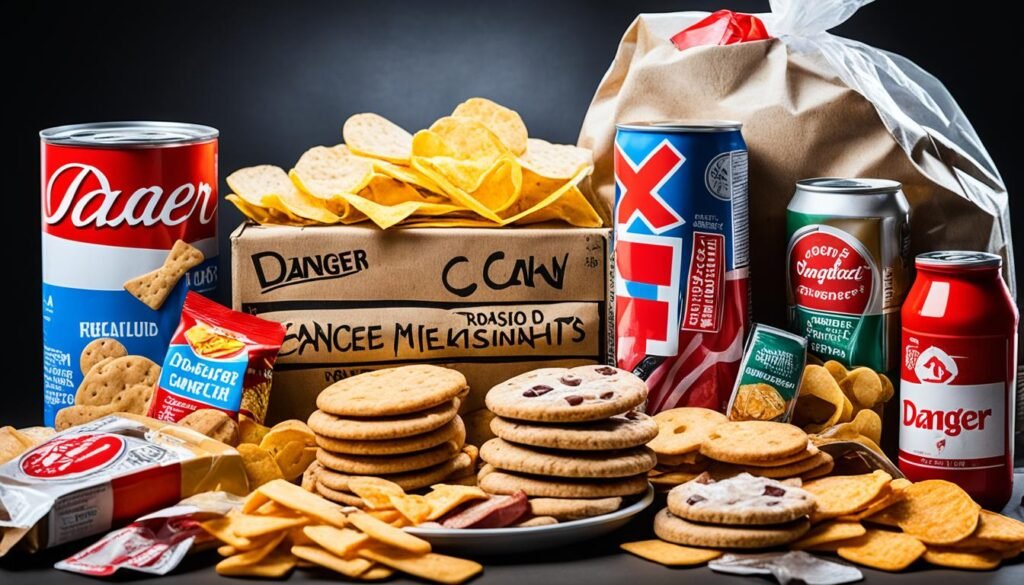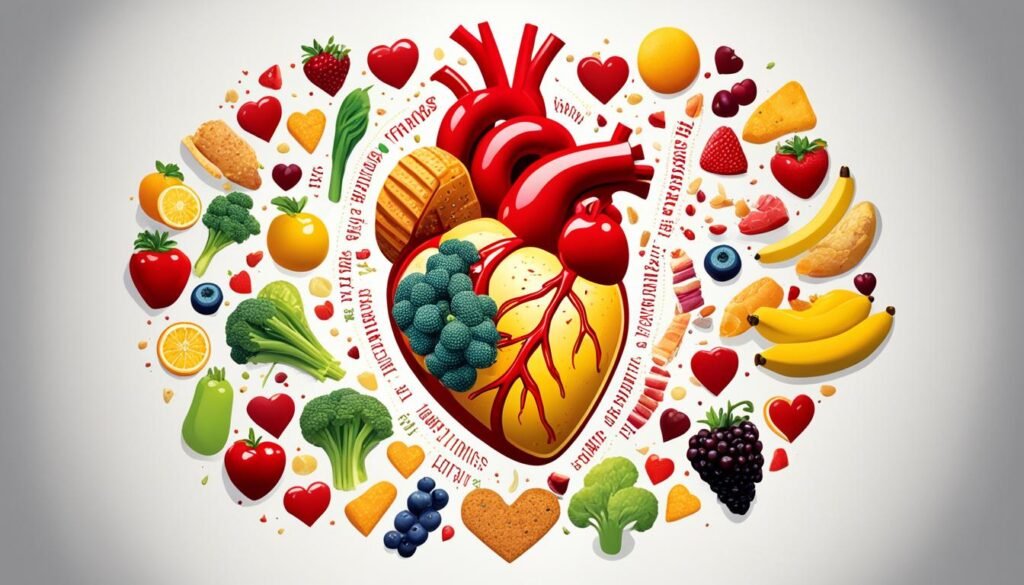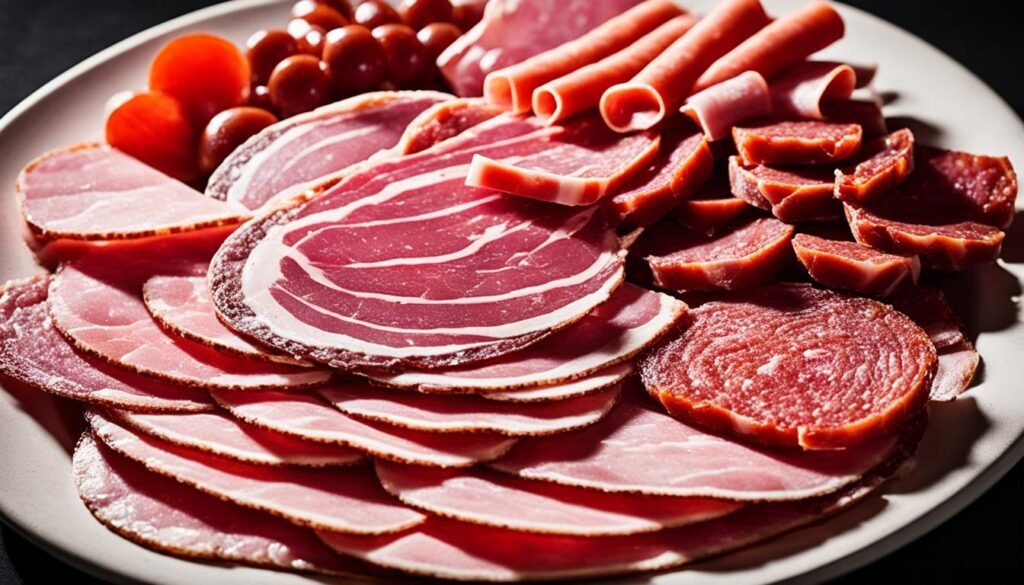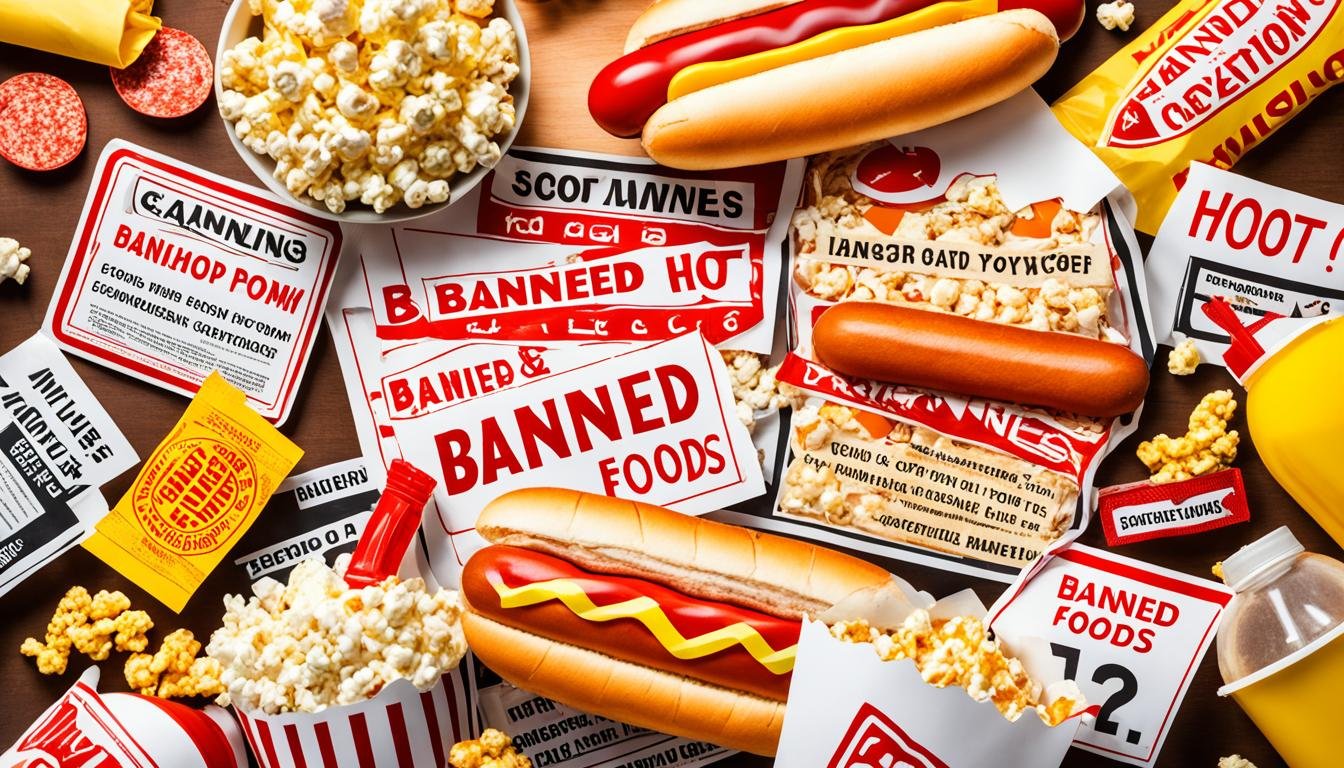Did you know that over 100 countries have banned or limited some food ingredients and additives? They did this because these items could be connected to cancer and other serious health problems. Sadly, we might still eat these risky substances every day. This article explores ten foods and substances that global bans target for their links to cancer.
Key Takeaways
- Numerous countries have banned or restricted the use of various food additives and ingredients due to their potential connection with cancer and other health risks.
- Toxic ingredients like trans fats, artificial food dyes, sodium nitrite/nitrate, Olestra, and Brominated Vegetable Oil (BVO) have been banned in multiple countries.
- The banning or regulation of these hazardous substances is driven by compelling scientific evidence linking them to adverse health effects, including cancer, heart disease, and digestive issues.
- While the United States has been slower to act, several states have now proposed or passed laws to prohibit the use of certain cancer-causing food additives.
- The food industry has pushed back against these bans, arguing that the FDA’s scientific review process should be followed, but public health advocates continue to call for stricter regulations to protect consumers.
Unveiling the Hidden Dangers: Foods Banned for Carcinogenic Ingredients
Food items get banned in many places for having carcinogenic ingredients. This includes two popular masala brands in Singapore and Hong Kong. Use of synthetic ingredients can lead to bad outcomes. This is why some foods are off the shelves. People should pick healthy foods to stay safe.
Shocking Revelations: Uncovering the Truth Behind Banned Products
Five U.S. states are saying no to certain food or color additives that might cause cancer. But, other states think these ideas are not based on enough science. They’re not sure banning is the best move. This makes rules confusing for shoppers.
Protecting Public Health: The Rationale Behind Food Safety Regulations
California banned four food additives that can cause health problems. These issues include cancer and mood disorders. The state wants others to also stop people from eating dangerous chemicals in foods.

Trans Fats: The Silent Killers on Your Plate
For a long time, trans fats improved how processed foods felt and lasted. But, they’re not all good. Studies have shown they can up the “bad” cholesterol in our blood. This makes us more likely to get heart disease.
The Rise and Fall of Trans Fats: From Widespread Use to Global Bans
Denmark started by banning trans fats in 2003. They feared for people’s health. Now, other places like Bangladesh, India, and the Philippines have also said no to trans fats. This change is making the world’s food safer.
Unraveling the Health Risks: How Trans Fats Endanger Your Heart
By not allowing artificial trans fats in 2015, the FDA made a big move. These fats can make “bad” cholesterol rise and “good” cholesterol drop. This is dangerous for our hearts. Now, many countries are working hard to get trans fats out of food for good.

Artificial Food Dyes: Tinting Your Food with Potential Harm
The bright colors in our food and drinks can look good. But, using artificial food dyes has made many people worry. Some studies show that these dyes might make kids hyper or even cause cancer.
Vibrant Colors, Hidden Dangers: The Link Between Food Dyes and Health Concerns
Many foods look brighter because of artificial food dyes. But, more and more people are worrying about the health risks. Some countries have even banned these dyes to protect people.
Hyperactivity and Beyond: Exploring the Effects of Artificial Dyes on Children
Not only do artificial food dyes possibly cause cancer, but they might make kids too active. In 2021, the California Environmental Protection Agency found that Red Dye No. 3 could affect how kids behave. Due to these concerns, some states in the U.S. are working to stop using these dyes.

10 Foods That Were Banned Due to Cancer-Causing Ingredients
Sodium Nitrite/Nitrate: Preserving Meat, Compromising Health
Sodium nitrite and sodium nitrate are used to keep meats like bacon and hot dogs fresh. But, they have been found to turn into cancer-causing compounds called nitrosamines. Some countries, including Norway and Canada, have limited their use in meats to protect people’s health.
Olestra: The Fat Substitute with Digestive Consequences
Olestra is a fat substitute found in some snack foods. UK and Canada have set limits on it given its digestive issues and its hindrance on absorbing certain vitamins. The health benefits of this ingredient are often debated because of its drawbacks.
Brominated Vegetable Oil: The Controversial Emulsifier in Beverages
Brominated vegetable oil (BVO) is used in some drinks to keep flavorings mixed in. But, it’s been banned or restricted in over 100 countries for causing nerve issues and thyroid problems. The US FDA wants to ban it too, warning about its negative health effects.

Potassium Bromate: The Hidden Threat in Your Daily Bread
Potassium bromate is a troubling food additive that’s often used in baking. It makes dough stronger and improves the texture of baked goods. This includes items like bagels, pizza dough, tortillas, and pastries. But here’s the issue: research shows it can cause cancer in animals. So, it might pose a cancer risk to people, too.
Many countries have now banned potassium bromate. The European Union, Canada, and China are among those that forbid its use. They did this to protect public health. But in the U.S., it’s still allowed in bread products. Even though an international cancer research agency says it’s likely to cause cancer.
This chemical isn’t just a cancer risk. It can also irritate your nose, throat, and lungs. Plus, it might lead to the growth of tumors in your kidneys and thyroid. The danger in our bread shows we need stricter food safety rules. And we need companies to tell us what’s really in our food, to keep us safe from harm.

Your point of view caught my eye and was very interesting. Thanks. I have a question for you.